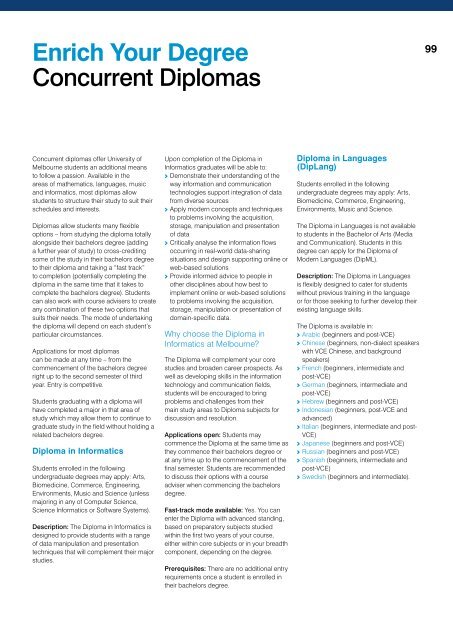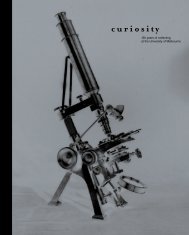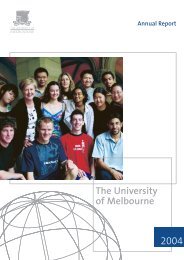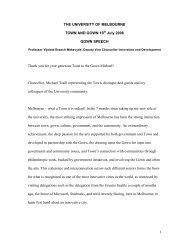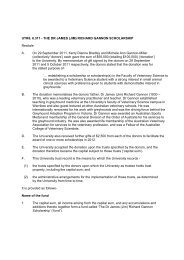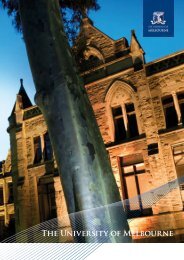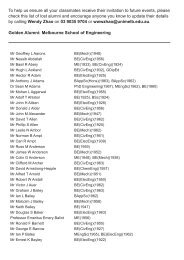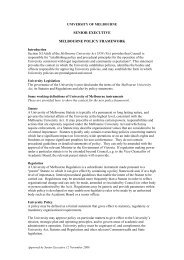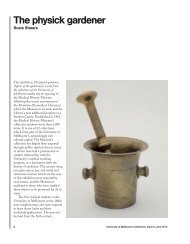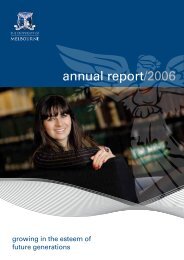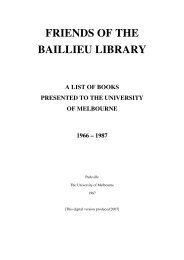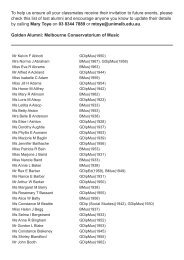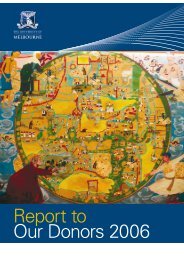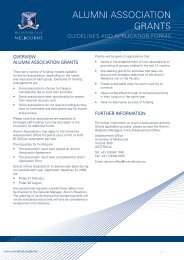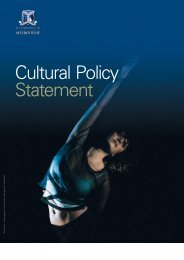2010 International Undergraduate Prospectus nts. u.au
2010 International Undergraduate Prospectus nts. u.au
2010 International Undergraduate Prospectus nts. u.au
You also want an ePaper? Increase the reach of your titles
YUMPU automatically turns print PDFs into web optimized ePapers that Google loves.
Enrich Your Degree<br />
Concurrent Diplomas<br />
99<br />
Concurrent diplomas offer University of<br />
Melbourne stude<strong>nts</strong> an additional means<br />
to follow a passion. Available in the<br />
areas of mathematics, languages, music<br />
and informatics, most diplomas allow<br />
stude<strong>nts</strong> to structure their study to suit their<br />
schedules and interests.<br />
Diplomas allow stude<strong>nts</strong> many flexible<br />
options – from studying the diploma totally<br />
alongside their bachelors degree (adding<br />
a further year of study) to cross-crediting<br />
some of the study in their bachelors degree<br />
to their diploma and taking a “fast track”<br />
to completion (potentially completing the<br />
diploma in the same time that it takes to<br />
complete the bachelors degree). Stude<strong>nts</strong><br />
can also work with course advisers to create<br />
any combination of these two options that<br />
suits their needs. The mode of undertaking<br />
the diploma will depend on each student’s<br />
particular circumstances.<br />
Applications for most diplomas<br />
can be made at any time – from the<br />
commencement of the bachelors degree<br />
right up to the second semester of third<br />
year. Entry is competitive.<br />
Stude<strong>nts</strong> graduating with a diploma will<br />
have completed a major in that area of<br />
study which may allow them to continue to<br />
graduate study in the field without holding a<br />
related bachelors degree.<br />
Diploma in Informatics<br />
Stude<strong>nts</strong> enrolled in the following<br />
undergraduate degrees may apply: Arts,<br />
Biomedicine, Commerce, Engineering,<br />
Environme<strong>nts</strong>, Music and Science (unless<br />
majoring in any of Computer Science,<br />
Science Informatics or Software Systems).<br />
Description: The Diploma in Informatics is<br />
designed to provide stude<strong>nts</strong> with a range<br />
of data manipulation and presentation<br />
techniques that will complement their major<br />
studies.<br />
Upon completion of the Diploma in<br />
Informatics graduates will be able to:<br />
>>Demonstrate their understanding of the<br />
way information and communication<br />
technologies support integration of data<br />
from diverse sources<br />
>>Apply modern concepts and techniques<br />
to problems involving the acquisition,<br />
storage, manipulation and presentation<br />
of data<br />
>>Critically analyse the information flows<br />
occurring in real-world data-sharing<br />
situations and design supporting online or<br />
web-based solutions<br />
>>Provide informed advice to people in<br />
other disciplines about how best to<br />
implement online or web-based solutions<br />
to problems involving the acquisition,<br />
storage, manipulation or presentation of<br />
domain-specific data.<br />
Why choose the Diploma in<br />
Informatics at Melbourne?<br />
The Diploma will complement your core<br />
studies and broaden career prospects. As<br />
well as developing skills in the information<br />
technology and communication fields,<br />
stude<strong>nts</strong> will be encouraged to bring<br />
problems and challenges from their<br />
main study areas to Diploma subjects for<br />
discussion and resolution.<br />
Applications open: Stude<strong>nts</strong> may<br />
commence the Diploma at the same time as<br />
they commence their bachelors degree or<br />
at any time up to the commencement of the<br />
final semester. Stude<strong>nts</strong> are recommended<br />
to discuss their options with a course<br />
adviser when commencing the bachelors<br />
degree.<br />
Fast-track mode available: Yes. You can<br />
enter the Diploma with advanced standing,<br />
based on preparatory subjects studied<br />
within the first two years of your course,<br />
either within core subjects or in your breadth<br />
component, depending on the degree.<br />
Prerequisites: There are no additional entry<br />
requireme<strong>nts</strong> once a student is enrolled in<br />
their bachelors degree.<br />
Diploma in Languages<br />
(DipLang)<br />
Stude<strong>nts</strong> enrolled in the following<br />
undergraduate degrees may apply: Arts,<br />
Biomedicine, Commerce, Engineering,<br />
Environme<strong>nts</strong>, Music and Science.<br />
The Diploma in Languages is not available<br />
to stude<strong>nts</strong> in the Bachelor of Arts (Media<br />
and Communication). Stude<strong>nts</strong> in this<br />
degree can apply for the Diploma of<br />
Modern Languages (DipML).<br />
Description: The Diploma in Languages<br />
is flexibly designed to cater for stude<strong>nts</strong><br />
without previous training in the language<br />
or for those seeking to further develop their<br />
existing language skills.<br />
The Diploma is available in:<br />
> >Arabic (beginners and post-VCE)<br />
> >Chinese (beginners, non-dialect speakers<br />
with VCE Chinese, and background<br />
speakers)<br />
> >French (beginners, intermediate and<br />
post-VCE)<br />
> >German (beginners, intermediate and<br />
post-VCE)<br />
> >Hebrew (beginners and post-VCE)<br />
> >Indonesian (beginners, post-VCE and<br />
advanced)<br />
> >Italian (beginners, intermediate and post-<br />
VCE)<br />
> >Japanese (beginners and post-VCE)<br />
> >Russian (beginners and post-VCE)<br />
> >Spanish (beginners, intermediate and<br />
post-VCE)<br />
> >Swedish (beginners and intermediate).


